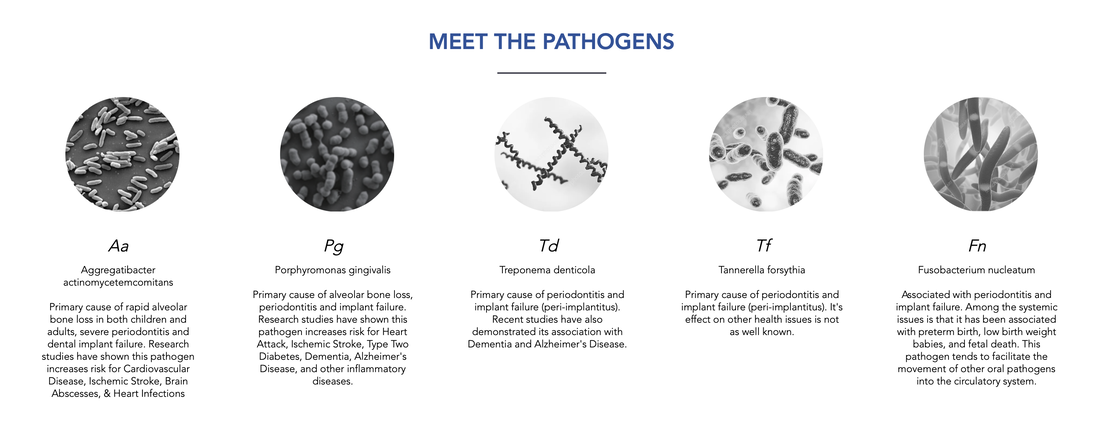Did you know 80% of adults over the age of 35 have some form of gum disease? Of the hundreds of species of bacteria that live in your mouth, there are FIVE you don’t want. These 5 high risk pathogens not only wreak havoc in the mouth, but there is now a clear connection to your body too.
Two decades and dozens of scientific studies link these bacteria to a growing list of systemic diseases in what is called the oral systemic, or mouth body connection. These oral pathogens can contribute to up to 50% of heart attacks, high risk pregnancy, dementia and Alzheimers development, and diabetes. These bacteria can be present long before the visible signs of infection or disease.
Find out if your mouth is putting your body at risk. We are proud to offer the HR5 by Direct Diagnostics test in our office. It is a simple, affordable, and highly accurate saliva test that will tell you the exact levels of each of these bacteria in your mouth. And there are many treatment options available to clear and manage the bacteria if present.
Two decades and dozens of scientific studies link these bacteria to a growing list of systemic diseases in what is called the oral systemic, or mouth body connection. These oral pathogens can contribute to up to 50% of heart attacks, high risk pregnancy, dementia and Alzheimers development, and diabetes. These bacteria can be present long before the visible signs of infection or disease.
Find out if your mouth is putting your body at risk. We are proud to offer the HR5 by Direct Diagnostics test in our office. It is a simple, affordable, and highly accurate saliva test that will tell you the exact levels of each of these bacteria in your mouth. And there are many treatment options available to clear and manage the bacteria if present.
WHAT IS THIS SERVICE?
With a simple salivary test, five specific bacteria (Aa, Pg, Td, Tf, and Fn) can be identified and isolated. These bacteria are most frequently mentioned as contributors to all chronic inflammatory diseases including cardiovascular disease, ischemic stroke, brain abscesses, & heart infections. These same bacteria are also directly associated with alveolar bone loss which leads to tooth loss if not treated.
WHAT IS THE PROCEDURE?
Utilizing the latest qPCR technology, we offer the most accurate test (lowest limit of detection) available to test for bacteria in saliva. Accuracy means we find these harmful pathogens early, making them easier to treat and driving successful outcomes faster. Testing is as simple as providing a saliva sample to be sent to our lab for review.
WHAT ARE THE BENEFITS?
"Periodontal disease is a serious inflammatory and infectious disease, and yet dentists are still primarily using ‘technology' that was invented in 1936 (the periodontal probe) to both diagnose and form treatment plans. The periodontal probe does not diagnose an infection. It simply measures the past damage that has been driven by pathogens that set the immune process into a ‘chronic damage mode' (chronic inflammation). Because every infection is different, it makes zero scientific sense to treat every patient as if they have the same infection." - Dr. Tom Nabors
With a simple salivary test, five specific bacteria (Aa, Pg, Td, Tf, and Fn) can be identified and isolated. These bacteria are most frequently mentioned as contributors to all chronic inflammatory diseases including cardiovascular disease, ischemic stroke, brain abscesses, & heart infections. These same bacteria are also directly associated with alveolar bone loss which leads to tooth loss if not treated.
WHAT IS THE PROCEDURE?
Utilizing the latest qPCR technology, we offer the most accurate test (lowest limit of detection) available to test for bacteria in saliva. Accuracy means we find these harmful pathogens early, making them easier to treat and driving successful outcomes faster. Testing is as simple as providing a saliva sample to be sent to our lab for review.
WHAT ARE THE BENEFITS?
"Periodontal disease is a serious inflammatory and infectious disease, and yet dentists are still primarily using ‘technology' that was invented in 1936 (the periodontal probe) to both diagnose and form treatment plans. The periodontal probe does not diagnose an infection. It simply measures the past damage that has been driven by pathogens that set the immune process into a ‘chronic damage mode' (chronic inflammation). Because every infection is different, it makes zero scientific sense to treat every patient as if they have the same infection." - Dr. Tom Nabors
Give us a call and start testing today!
Frank Pastore, D.D.S.
25908 Newport Road, Suite C
Menifee, CA. 92584
951-301-3655
25908 Newport Road, Suite C
Menifee, CA. 92584
951-301-3655



